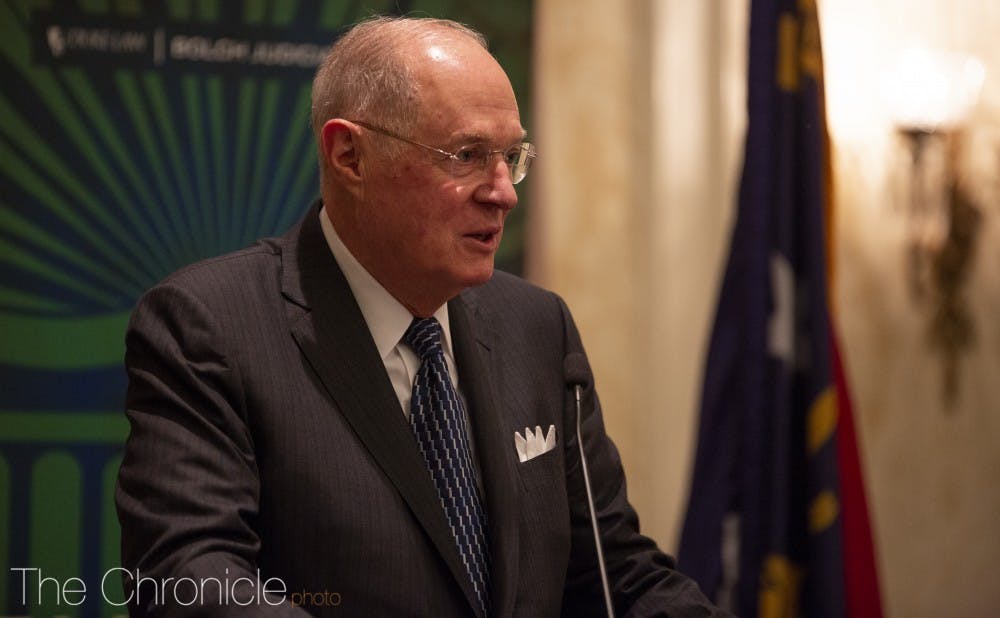U.S. Supreme Court Justice Anthony Kennedy received the inaugural Bolch Prize for the Rule of Law at a ceremony at the Washington Duke Inn and Golf Club Thursday.
Presented by the Bolch Judicial Institute of Duke Law School, the award highlights the distinction of an individual in the rule of law, a key area of focus of the institute. The retired justice was chosen as its first recipient due to a lifelong commitment to the preservation and promotion of the rule of law.
“The law must protect human dignity. The law must protect human freedom. The law comes from the people to the government,” Kennedy said. “Not the other way around.”
The Bolch Judicial Institute was founded in 2018 with a $10 million gift from Carl Bolch Jr., Law '67, and Susan Bass Bolch. The aim of the institute is to educate sitting judges nationally and internationally about “rule-of-law principles, judicial independence and law reform through technology and innovation,” according to the Institute’s website.
U.S. Supreme Court Justice Samuel Alito and President Vincent Price gave remarks about Kennedy’s legacy. Judge Allyson Duncan—Law ’75 and a member of the Duke Board of Trustees—also spoke at the event.
Kerry Abrams, James B. Duke and Benjamin N. Duke dean of the Law School and professor of law, delivered the welcome speech, highlighting Kennedy’s "legacy and life in the law and many contributions and advancement in the rule of law in our country as well as around the world."
Three decades on the nation's highest court
Kennedy served 30 years on the Supreme Court, with his tenure stretching from 1988 to 2018. From 1965 to 1988, he taught constitutional law at the McGeorge School of Law, University of the Pacific in Sacramento, Calif., and served as a judge on the 9th U.S. Court of Appeals from 1975 until the start of his term on the Supreme Court.
During Kennedy’s time in Sacramento, he knew David F. Levi, director of the Bolch Judicial Institute. Levi—who is also the Levi family professor of law and judicial studies and former dean of Duke Law School—presented the award to Kennedy, remarking how it was a “rare privilege to have two Supreme Court justices [at Duke] at the same time.”
Alito said that, at a time when some try to silence others, it is “vitally important in our system that both sides are heard.” He noted Kennedy’s particular keenness for “remaining open-minded and hearing both sides.”
“They could not have made a better decision for this the inaugural award,” Alito said. “I served with him for 13 years, and I cannot tell you how much I have learned from his example.”
Defining the 'rule of law'
Kennedy said that the first time he was explicitly asked to define the rule of law was when he was on a visit to China, at a time when it had not occurred to him “what it ought to be.”
Thus, Kennedy crafted a definition of the rule of law that has now been translated into many languages and was adopted by the Committee on Legal Empowerment of the Poor, which was a United Nations organization of which Kennedy was a member.
“His definition simply and elegantly explains that the rule of law ideal includes the concepts of freedom, equal treatment and individual dignity within a legal system that permits redress in which the law is superior to official will,” Levi said.
Levi commended the significance of how aware Kennedy was of the importance of the rule of law for democracies around the world.
Kennedy said that the law must be accessible, protect human dignity and human freedom and that it must “come from the people to the government, not the other way around.” To Kennedy, these principles must be learned and re-learned every generation.
“And it is not just the academy that must teach, it is not just the bench that must teach, it is the bar that must teach,” the retired justice said. “All of us in this profession must continue to teach and to learn and to teach and to learn again the meaning and definition of the rule of law.”
The rule of law 'under attack'
Kennedy, known for his outreach to the international legal community, described a conversation he had with a judge from Eastern Europe about what she described as the decline of rule of law in her country and lack of concern from others about the issue.
“In the last few decades of the last century, it looked like democracy is on the rise everywhere. After the first decade of this century, it became clear that democracy is slipping away, in part by deliberate attack,” Kennedy said. “We must understand that the rule of law as we know it, the rule of law as we define it—the rule of law as it must be defined—is under attack.”
To solve this problem, Kennedy said that the country must “return to a decent, respectful, thoughtful, civic dialogue,” as it is the foundation of creating a consensus which is rooted in the “belief in the rule of law and our belief in freedom.”
After remarking how the Bolch Prize is made of glass, Kennedy made an analogy between glass and the rule of law.
“Once the rule of law is broken, it requires great effort to fix it,” he said.
Get The Chronicle straight to your inbox
Signup for our weekly newsletter. Cancel at any time.

Stefanie Pousoulides is The Chronicle's Investigations Editor. A senior from Akron, Ohio, Stefanie is double majoring in political science and international comparative studies and serves as a Senior Editor of The Muse Magazine, Duke's feminist magazine. She is also a former co-Editor-in-Chief of The Muse Magazine and a former reporting intern at PolitiFact in Washington, D.C.

